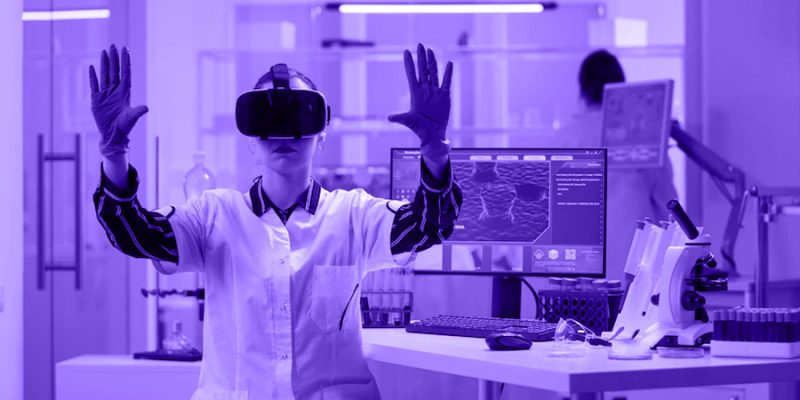
Find out how metaverse is driving the metamorphosis of the healthcare industry
Despite the fact that the Metaverse technology is driving the metamorphosis of numerous industries. This shouldn’t come as a surprise because the new technology of the metaverse in the healthcare industry has the potential to change how we play, learn, work, and interact with one another.
Metaverse in the healthcare industry has been quickly changing these scenes starting from the beginning of web 2.0 and the Metaverse’s effect will be the same. The Metaverse technology is driving the metamorphosis of the healthcare industry, just as telehealth and mobile device integration did in the past. This development will have an impact not only on user experience but also on all levels of the healthcare industry.
Medical education, therapeutic resources, social distance accommodations, and more are expected to benefit greatly from virtual reality.
The metaverse is a hybrid of augmented, virtual, and physical reality. The metaverse technology creates a virtual world experience that can be accessed online. Simulating human emotions and actions is possible in a metaverse. The entire social and economic structure of both the real and virtual worlds is included in the metaverse technology.
Let’s take a look at how Metaverse technology is driving the metamorphosis of the healthcare industry.
Medical Training:
The user-immersion aspects of the Metaverse technology are an excellent vehicle for training medical staff on a larger scale at a lower cost. The use of costly traditional methods like cadavers is no longer necessary for surgical training because it can now include more realistic scenarios. Utilizing a virtual subject reduces that expense and enables more frequent and individualized training. Additionally, surgical trainees’ technical capabilities, such as precision and decision-making abilities, may benefit from the Metaverse’s ability to create realistic scenarios.
However, the advantages of education extend beyond those in training. The metaverse in the healthcare industry will also be used for complicated surgical procedures because doctors are always trying to improve the methods that are already in use and increase success rates. This also gives healthcare professionals from all over the world a chance to learn new skills by allowing doctors from different parts of the world to work together to practice procedures on a virtual patient in the Metaverse. These doctors can now train on challenging clinical cases that they would otherwise only encounter on a live patient.
Telehealth:
Telehealth quickly gained popularity during the COVID-19 pandemic. The World Health Organization estimates that only 43% of healthcare facilities will be able to provide remote service by 2020.That percentage has increased to 95% today. Physicians and nurses can now more quickly and effectively treat patients with minor ailments and complete routine consultations thanks to advancements in this technology. As the Metaverse in the healthcare industry develops it offers an entirely new set of possibilities resulting in the metamorphosis of the healthcare industry
Education:
In addition to its obvious capacity to facilitate top-notch education for students from anywhere in the world, the Metaverse technology is propelling metamorphosis for both medical device developers and pharmaceutical companies. Life science companies and manufacturers of medical devices can teach and train healthcare professionals about their therapeutics and equipment with the help of this technology.
The technology of the metaverse is something that pharmaceutical companies can use to show their timelines, show how the drug works, and even recreate the experiences caused by various conditions.In order to improve everyone’s productivity and usability, the Metaverse in the healthcare industry will become a place where professionals from both industries can receive instruction on their respective therapeutics and devices.
Surgery in the Metaverse:
Minimally invasive procedures are already being carried out by doctors by means of AR, VR, and AI.A 3D view of a patient’s body is provided by these immersive technologies to medical professionals, facilitating the planning and execution of procedures.
Metaverse technology-based augmented and virtual reality (AR and VR) simulations are also a safe way for aspiring surgeons to practice their skills and deal with a variety of technical obstacles and complications. During an operation, a surgeon can even get a head-up display so they don’t have to look away from the patient on the table to see screen data or images. This has cause the metamorphosis of the healthcare industry.
Treatment for Mental Illness in the Metaverse:
As a result of the metaverse in the healthcare industry, the mental health treatment has the potential to undergo a paradigm shift. The metaverse technology’s immersive experiences could be used by psychiatrists and psychotherapists to treat problems like:
- Disorders of the eating body
- PTS
- Anxiety disorders
- Delusions
- Psychosis
- Hallucinations
In addition, the metaverse in the healthcare industry may facilitate access to mental health care for disabled individuals or individuals who face geographic barriers to receiving care.
The primary advantages of the metaverse in the healthcare industry for connecting and bringing healthcare providers and consumers together are gamification and personalization. People are currently less motivated to alter their lifestyle. That can be altered by the Open Metaverse. It has the potential to encourage people to adopt a healthy lifestyle and receive tokens or rewards in the virtual and real worlds. Metaverse in the healthcare industry will benefit from providing unique user experiences through fitness gamification and healthcare rewards. People who have greater ownership and control over their health data will be able to use that data to power their NFTs (Non-Fungible Tokens), and they will also be able to exchange values through tokenization.



















